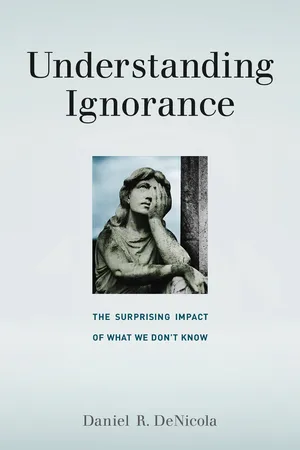
- English
- ePUB (mobile friendly)
- Available on iOS & Android
About this book
Ignorance is trending. Politicians boast, "I'm not a scientist." Angry citizens object to a proposed state motto because it is in Latin, and "This is America, not Mexico or Latin America." Lack of experience, not expertise, becomes a credential. Fake news and repeated falsehoods are accepted and shape firm belief. Ignorance about American government and history is so alarming that the ideal of an informed citizenry now seems quaint. Conspiracy theories and false knowledge thrive. This may be the Information Age, but we do not seem to be well informed. In this book, philosopher Daniel DeNicola explores ignorance—its abundance, its endurance, and its consequences.
DeNicola aims to understand ignorance, which seems at first paradoxical. How can the unknown become known—and still be unknown? But he argues that ignorance is more than a lack or a void, and that it has dynamic and complex interactions with knowledge. Taking a broadly philosophical approach, DeNicola examines many forms of ignorance, using the metaphors of ignorance as place, boundary, limit, and horizon. He treats willful ignorance and describes the culture in which ignorance becomes an ideological stance. He discusses the ethics of ignorance, including the right not to know, considers the supposed virtues of ignorance, and concludes that there are situations in which ignorance is morally good.
Ignorance is neither pure nor simple. It is both an accusation and a defense ("You are ignorant!" "Yes, but I didn't know!"). Its practical effects range from the inconsequential to the momentous. It is a scourge, but, DeNicola argues daringly, it may also be a refuge, a value, even an accompaniment to virtue.
Frequently asked questions
- Essential is ideal for learners and professionals who enjoy exploring a wide range of subjects. Access the Essential Library with 800,000+ trusted titles and best-sellers across business, personal growth, and the humanities. Includes unlimited reading time and Standard Read Aloud voice.
- Complete: Perfect for advanced learners and researchers needing full, unrestricted access. Unlock 1.4M+ books across hundreds of subjects, including academic and specialized titles. The Complete Plan also includes advanced features like Premium Read Aloud and Research Assistant.
Please note we cannot support devices running on iOS 13 and Android 7 or earlier. Learn more about using the app.
Information
Table of contents
- Cover
- Title page
- Copyright page
- Dedication
- Table of Contents
- Preface
- I Images of Ignorance
- II Ignorance as Place
- III Ignorance as Boundary
- IV Ignorance as Limit
- V Ignorance as Horizon
- Bibliography
- Index